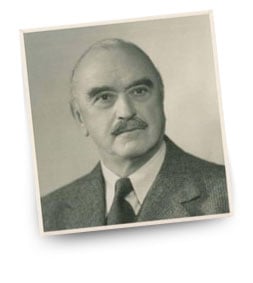. Independent and family-owned
. Over 100 years of activity in the freight industry
. Provides advanced supply chain management services
Founded in 1913 by Ernest Sommer, World Transport Agency (WTA) has over a century of experience working in the international freight industry, during which time its business has been built upon a foundation of passion and professionalism. With its network of global partners, and air, sea, overland and warehousing capabilities, WTA is able to transport all manner of goods anywhere in the world, and provide its clients with a completely personalised experience that helps to streamline their respective supply chains and reduce their overall costs.

Transporting Goods Can be Challenging
“Primarily, the reason we have been in business for over 100 years is that we excel at providing exceptional customer service to every single one of our clients,” begins WTA Managing Director, Thomas Kuehn. “We recognise that transporting goods can be a challenging, expensive operation, so we make sure to listen to our clients’ and gain a detailed understanding of their requirements in order to tailor our operations so as to provide a simplified, efficient logistics experience.”
Vertical Industry Sectors
WTA operates in a number of vertical industry sectors, with its most active currently being the food and beverage, and printed media markets, in the latter of which the company is one of the UK’s leading importers and exporters of printed materials from Europe and the Far East. “With each vertical industry in which we operate, we do all that we can to ensure that we understand its unique requirements and intricacies,” Thomas continues. “To achieve this, we have made it so that we have people employed by WTA that come with a wealth of experience in these different fields, who then become key account managers assigned to specific clients.”
At the heart of many of WTA’s clients’ challenges today is often the sheer complexity associated with global freight forwarding. As Thomas reveals, he has seen examples where companies have found themselves working with upwards of 30 different freight forwarders at one time, each with their own different processes. As one can imagine, this can create a large, time-consuming administrative burden. WTA’s answer to this problem comes in the form of its supply chain management service, and a new product that it initiated in 2018, the WTA Platform.

“Working hand-in-hand with the client, our team of international logistics specialists are able to perform an in-depth analysis of their existing supply chain, during which they look to unlock hidden value. By then developing a completely personalised solution, we can not only streamline the clients’ supply chain, but also remove administrative burdens, simplify structures, and free up resources to be used optimally elsewhere,” Thomas details.
With the WTA Platform,” he continues, “we take away all of the complexity of international freight forwarding by managing the various forwarders, shipping lines and airlines on behalf of our clients. We do so while providing full visibility and real-time tracking of the goods flow – via software that the client can install within their own premises – as well as a complete breakdown of costs of each individual process. This breakdown of costs comes in the form of a single invoice from ourselves, and when it comes to entering negotiations with the carriers of their goods, we always invite our clients’ to be a part of these discussions. This allows them to form their own opinion on whether to engage with carriers individually themselves, or remain using WTA for their supply chain service needs, which the vast majority do!
A pattern that has emerged with greater regularity in the last several years has been the interest in increasing numbers of UK companies looking to expand their activities into key export markets. With a high percentage of said companies lacking in significant knowledge and experience in this, it falls to a business such as WTA to provide the expertise and capabilities required to facilitate its clients’ success abroad.
“As a business, WTA has long possessed significant global coverage, having traded in the United States for well over half a century, and with our own offices and partnership agreements in China, Hong Kong, Canada, New Zealand, Australia and the Middle East,” Thomas explains. “This means that we have amassed a great deal of knowledge when it comes to the logistical and compliance-based requirements of said countries or regions, which companies that are new to exporting find invaluable. We can provide clear guidance on how best to approach these different markets, even helping to organise their entry into some, which further solidifies the strong partnerships we are proud to form with our clients.”
Investment in Infrastructure
In order to best accommodate client demand, WTA invests considerable sums into its infrastructure and its people on a yearly basis. Approximately 20 per cent of its annual net profit is channelled towards its IT development – vital in an industry that operates on ever-evolving technology – while an additional ten per cent of company profit goes towards the development of its people. “We place a large emphasis on training and nurturing the talents of our people,” explains WTA’s HR Director, Elaine Evans. “Among the different programmes we run, we have our own WTA Academy where we provide bespoke training, a successful apprenticeship scheme – we were one of the first companies to sign up to the new BIFA International Trade Specialists approved apprenticeship initiative – and we have dedicated up skilling plans tailored to employees across all levels of the business.”

Thomas, Elaine and the rest of the WTA family are all excited about what the coming months hold for the company.
“Our plans for the short-to-medium term include further enhancing our offering through products such as the WTA Platform – which continues to see great interest from old and new clients – and targeting new vertical industries to enter into,” Thomas says. “We are also committed to playing our part in delivering change to the logistics sector, specifically when it comes to our environmental impact. As such, we are taking strides towards reducing both our own, and our clients’, carbon footprint, whether that be through making all of our company cars electric by 2020, or by delivering monthly and yearly activity reports to our clients that they can use to influence their own carbon neutral efforts.”
This article first appeared in Land Sea and Air Magazine.








